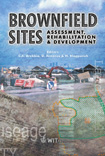Public Policies That Foster Contaminated Land Recycling – Expanding The Horizon
Price
Free (open access)
Transaction
Volume
55
Pages
Published
2002
Size
635 kb
Paper DOI
10.2495/BF020391
Copyright
WIT Press
Author(s)
C. M. Morgan & P. A. Brown
Abstract
Public policies that foster contaminated land recycling- expanding the horizon C. M. Morgan & P. A. Brown Marasco Newton Group, Ltd. Abstract This paper identifies the public policy levers that have been developed to address brownfields cleanup and reuse and asks whether the best practices identified to date are sufficient to address the problems posed by individual brownfield properties as well as the larger local and regional challenges implicated by these properties. More specifically, this paper suggests that the current, limited linear approach to brownfields cleanup and reuse (i.e., site identification, assessment, cleanup, and redevelopment) is insufficient to meet the complex problems associated with brownfields cleanup and sustainable reuse. Despite the great advances seen in many local, regional, and national reuse programs, the creation of new brownfields is still exceeding the number of sites reclaimed. The purpose of this paper is to propose and explore a more comprehensive, institutionalized approach to brownfields that addresses prevention and regeneration to ensure that the number, size, and complexity of \“new” brownfields created is minimized as much as possible. Introduction Virtually every country-regardless of size, population, geographic characteristics, political structure, legal system, industrial maturity, economic base-has or will face the issues associated with contaminated properties that are underused or have been abandoned. While the terms used to describe these properties vary from country to country (e.g., brownfields, derelict lands, vacant lands, contaminated properties, friches), the environmental, social, cultural, and economic challenges posed by these properties vary only in detail and scope. Many countries with mature or declining industrialized economies have spent the
Keywords




